THE IMPORTANCE OF CLEANING YOUR DOG'S TEETH
Welcome, fellow dog lovers! As devoted companions, our furry friends bring boundless joy and laughter into our lives. We cherish every wag of their tails, every sloppy kiss, and every playful romp in the backyard.
Yet, amidst these moments of bliss, there lies an aspect of care that often slips under the radar: dental hygiene. While it might not be as flashy as a new toy or as enticing as a tasty treat, the importance of maintaining your dog's dental health cannot be overstated.
After all, a healthy smile is not only a sign of happiness but also a reflection of overall well-being. So, as we welcome you to our comprehensive guide on why it's crucial to prioritize your dog's dental health by cleaning their teeth regularly, we remember that some pet owners overlook this aspect of care, unaware of the significant impact it can have on their dog's overall well-being.
In this blog post, we'll explore the importance of canine dental hygiene, the risks associated with neglecting it, and practical tips for maintaining your dog's oral health.
The importance of caring for your dog’s teeth
Dental care isn't just about aesthetics; it's about ensuring your dog leads a comfortable and healthy life. Imagine the discomfort of a toothache multiplied for your beloved pet! Dental issues in dogs are more prevalent than many pet owners realize.
Just like humans, dogs are susceptible to dental issues such as plaque buildup, tartar accumulation, gum disease, and tooth decay. Neglecting your dog's dental hygiene can lead to various health problems, including:
-
Periodontal Disease: This is one of the most common dental issues in dogs, affecting up to 80% of them by the age of three. Periodontal disease can cause pain, infection, and even tooth loss if left untreated.
-
Systemic Health Problems: Poor oral health in dogs can also affect other parts of their body, including the heart, liver, and kidneys. Bacteria from the mouth can enter the bloodstream, potentially leading to serious systemic conditions.
-
Pain and Discomfort: Imagine the discomfort of having a toothache or sore gums. Dogs experience similar discomfort when they suffer from dental problems, but they can't communicate it as effectively as humans.
Remember that by prioritizing your dog's dental health, you're not just preventing bad breath; you're safeguarding their overall well-being.
The Benefits of Cleaning Your Dog's Teeth
Regular dental care is the cornerstone of preventive medicine for our canine companions. By incorporating a dental care routine into your dog's regimen, you're setting them up for a lifetime of good oral health. Brushing your dog's teeth and using all-natural and organic pet safe products like Pawtitas Dental Spray and Dental Powder can help prevent plaque and tartar buildup, reducing the risk of gum disease and tooth decay.
-
Prevention of Dental Disease: By implementing a regular dental care routine, you can prevent the buildup of plaque and tartar, reducing the risk of periodontal disease and other oral health issues.
-
Improved Breath: Bad breath (halitosis) is a common sign of dental problems in dogs. Regular brushing and dental cleanings can help freshen your dog's breath and improve their overall oral hygiene.
-
Longer Lifespan: Taking care of your dog's teeth can contribute to their overall health and longevity. By preventing dental disease and related health issues, you can help ensure a happier and healthier life for your furry friend.
Tips for Cleaning Your Dog's Teeth:
Now that you understand the importance of canine dental health, here are some practical tips for keeping your dog's teeth clean:
-
Brushing: Use a dog-specific, organic toothbrush and toothpaste such as the Pawtitas Dog Dental Spray to brush your dog's teeth regularly. Start slowly and gradually increase the duration of brushing sessions as your dog gets used to the routine.
-
Dental Chews and Toys: Provide your dog with dental chews and toys designed to promote dental health. Chewing helps remove plaque and tartar buildup, keeping your dog's teeth clean and healthy.
-
Regular Vet Checkups: Schedule regular dental checkups with your veterinarian to monitor your dog's oral health and address any potential issues early on.
-
Professional Cleanings: Consider scheduling professional dental cleanings for your dog, especially if they have significant tartar buildup or signs of periodontal disease.
Step-by-Step Guide to Cleaning Your Dog's Teeth with Pawtitas Dental Spray and Dental Powder
-
Introduction: Introduce your dog to the dental routine gradually. Let them sniff and lick the a small portion of the toothpaste on your finger to familiarize themselves.
-
Application of Dental Spray: Gently pull back your dog’s lip and spray along the gumline. You can also add 3-5 sprays into their fresh drinking water. Make sure that their water bowl is always cleaned daily.
-
Application of Dental Powder: Apply a small amount of Pawtitas Dental Powder using a microfiber dog fingerbrush or a designated dog toothbrush. Gently lift your dog's lips and cheeks up and apply a small amount of Pawtitas Dental Powder Ready Scrub directly onto their teeth and gums, paying attention to areas prone to plaque buildup.
-
Consistency is Key: Repeat this process regularly, ideally a few times a week, to maintain optimal dental health.
Recommendation
When selecting dental products for your dog, opt for those specifically formulated for canines. Avoid human toothpaste, as it contains ingredients like fluoride that are harmful to dogs if swallowed. Look for products with natural ingredients and consult your vet for recommendations tailored to your dog's needs.
Extra care for canine dental health
In addition to regular dental cleanings, several preventive measures can support your dog's dental health:
-
Dental Chews and Toys: Provide your dog with dental chews or toys designed to promote oral hygiene and reduce plaque buildup. These products often feature textured surfaces that help scrub away plaque as your dog chews, making them an excellent addition to their oral care routine.
-
Dietary Considerations: Pay attention to your dog's diet, as certain foods can contribute to dental issues. Incorporate natural foods and a species-appropriate diet like raw foods and especially pre and probiotics for their gut health.
-
Regular Check-ups: Schedule annual dental check-ups with your veterinarian to monitor your dog's dental health and catch any issues early on. Your vet can perform a thorough examination of your dog's teeth and gums, identify any potential problems, and recommend appropriate treatment options.
Final thoughts:
Maintaining your dog's dental health is essential for their overall well-being and quality of life. By incorporating regular dental care into your pet care routine, you can help prevent dental disease, improve your dog's breath, and contribute to their long-term health and happiness. Remember, a healthy smile leads to a happy dog!
Click on this link to view our Dog Dental Spray Solution!




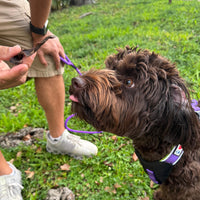

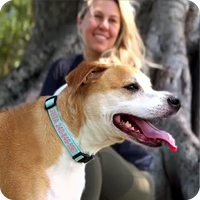

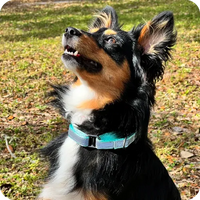



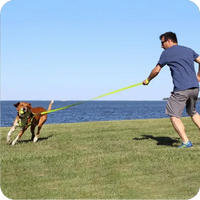

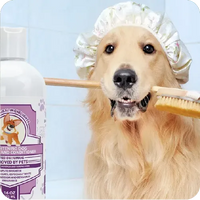
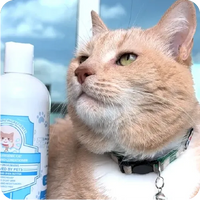







Leave a comment